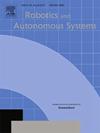轮式移动机器人的点稳定与轨迹跟踪控制策略
IF 5.2
2区 计算机科学
Q1 AUTOMATION & CONTROL SYSTEMS
引用次数: 0
摘要
针对轮式移动机器人在轨迹跟踪和点稳定任务中遇到的挑战,提出了一种新的控制律。针对移动机器人的非完整约束和速度饱和等问题,设计了一种适应这些限制的控制策略。通过引入新的期望速度矢量和航向角误差,该控制律不仅提高了机器人的跟踪精度,而且显著提高了收敛速度。利用李雅普诺夫稳定性理论严格证明了所提控制律的有效性,并通过MATLAB仿真实验验证了其性能。仿真结果表明,与现有控制方法相比,新控制律在收敛速度和行程上都有显著提高。该研究为移动机器人的精确控制提供了一个新的视角,并有可能促进其在各个领域的应用。未来的研究方向包括将该控制策略应用于实际机器人系统以及探索其在多机器人协同控制中的潜力。本文章由计算机程序翻译,如有差异,请以英文原文为准。
A control strategy for point stabilization and trajectory tracking of wheeled mobile robots
This paper addresses the challenges encountered by wheeled mobile robots in trajectory tracking and point stabilization tasks and proposes a novel control law. In view of issues such as the nonholonomic constraints and velocity saturation of mobile robots, a control strategy adaptable to these limitations is devised. By introducing a new desired velocity vector and heading-angle error, the proposed control law not only enhances the tracking accuracy of the robot but also significantly improves the convergence rate. The effectiveness of the proposed control law is rigorously proven using the Lyapunov stability theory, and its performance is verified through MATLAB simulation experiments. The simulation results indicate that, compared with existing control methods, the new control law exhibits a remarkable improvement in both convergence rate and travel distance. This research offers a new perspective for the precise control of mobile robots and has the potential to facilitate their applications in diverse fields. Future research directions encompass applying this control strategy to practical robot systems and exploring its potential in multi-robot cooperative control.
求助全文
通过发布文献求助,成功后即可免费获取论文全文。
去求助
来源期刊

Robotics and Autonomous Systems
工程技术-机器人学
CiteScore
9.00
自引率
7.00%
发文量
164
审稿时长
4.5 months
期刊介绍:
Robotics and Autonomous Systems will carry articles describing fundamental developments in the field of robotics, with special emphasis on autonomous systems. An important goal of this journal is to extend the state of the art in both symbolic and sensory based robot control and learning in the context of autonomous systems.
Robotics and Autonomous Systems will carry articles on the theoretical, computational and experimental aspects of autonomous systems, or modules of such systems.
 求助内容:
求助内容: 应助结果提醒方式:
应助结果提醒方式:


